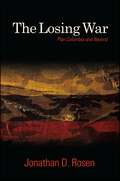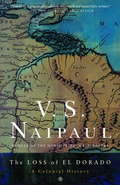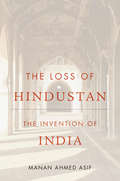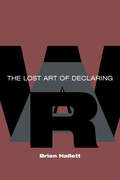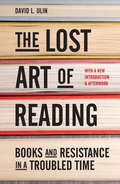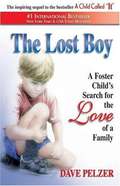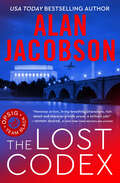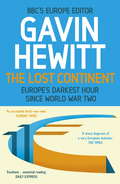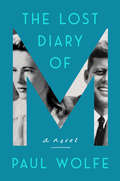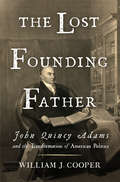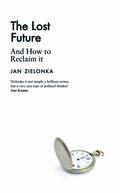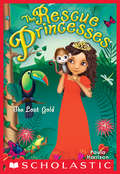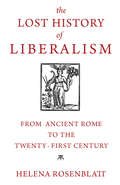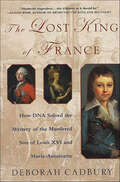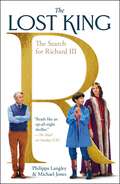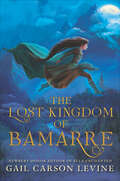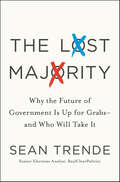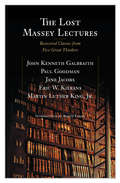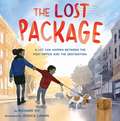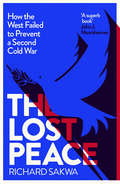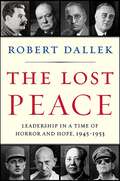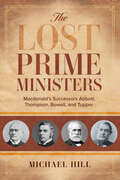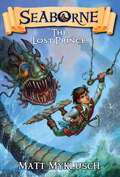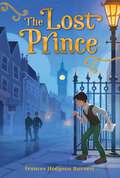- Table View
- List View
The Losing War: Plan Colombia and Beyond (SUNY series, James N. Rosenau series in Global Politics)
by Jonathan D. RosenPlan Colombia was an ambitious, multibillion dollar program of American aid to the country of Colombia to fight that nation's recreational drug industry. First signed into law by President Clinton in 2000, the program would, over a twelve year period, provide the Colombian government with more money than every other country in the region. But how successful was Plan Colombia, and is it a model worthwhile in applying to other countries? In The Losing War, Jonathan D. Rosen applies international relations theory to understand how the goals and objectives of Plan Colombia evolved over time, particularly after the events of 9/11. Various individuals, including Álvaro Uribe, the president of Colombia from 2002–2010, and George W. Bush, argued that Plan Colombia should be used as a model to help other countries combat drug trafficking. Plan Colombia was not mentioned in the Obama administration's 2011 budget proposal and no longer exists today. Rosen concludes that the policy failed to make substantial inroads in curtailing drug cultivation, production, or trafficking, thus calling into question the value of applying the same strategy to other countries, such as Mexico, in the present or future.
The Loss of El Dorado: A Colonial History
by V. S. NaipaulIn this masterpiece about Trinidad, the Nobel Prize-winning author has &“given us a lesson in history [and] shown us how it is best written&” (The New York Times).The history of Trinidad begins with a delusion: the belief that somewhere nearby on the South American mainland lay El Dorado, the mythical kingdom of gold. In this extraordinary and often gripping book, V. S. Naipaul—himself a native of Trinidad—shows how that delusion drew a small island into the vortex of world events, making it the object of Spanish and English colonial designs and a mecca for treasure-seekers, slave-traders, and revolutionaries.Amid massacres and poisonings, plunder and multinational intrigue, two themes emerge: the grinding down of the Aborigines during the long rivalries of the El Dorado quest and, two hundred years later, the man-made horror of slavery. An accumulation of casual, awful detail takes us as close as we can get to day-to-day life in the slave colony, where, in spite of various titles of nobility, only an opportunistic, near-lawless community exists, always fearful of slave suicide or poison, of African sorcery and revolt. Naipaul tells this labyrinthine story with assurance, withering irony, and lively sympathy. The result is historical writing at its highest level.
The Loss of Hindustan: The Invention Of India
by Manan Ahmed AsifA field-changing history explains how the subcontinent lost its political identity as the home of all religions and emerged as India, the land of the Hindus.Did South Asia have a shared regional identity prior to the arrival of Europeans in the late fifteenth century? This is a subject of heated debate in scholarly circles and contemporary political discourse. Manan Ahmed Asif argues that Pakistan, Bangladesh, and the Republic of India share a common political ancestry: they are all part of a region whose people understand themselves as Hindustani. Asif describes the idea of Hindustan, as reflected in the work of native historians from roughly 1000 CE to 1900 CE, and how that idea went missing.This makes for a radical interpretation of how India came to its contemporary political identity. Asif argues that a European understanding of India as Hindu has replaced an earlier, native understanding of India as Hindustan, a home for all faiths. Turning to the subcontinent’s medieval past, Asif uncovers a rich network of historians of Hindustan who imagined, studied, and shaped their kings, cities, and societies. Asif closely examines the most complete idea of Hindustan, elaborated by the early seventeenth century Deccan historian Firishta. His monumental work, Tarikh-i Firishta, became a major source for European philosophers and historians, such as Voltaire, Kant, Hegel, and Gibbon during the eighteenth and nineteenth centuries. Yet Firishta’s notions of Hindustan were lost and replaced by a different idea of India that we inhabit today.The Loss of Hindustan reveals the intellectual pathways that dispensed with multicultural Hindustan and created a religiously partitioned world of today.
The Lost Art of Declaring War
by Brien HallettHistorically, it has been assumed that war is violence and declarations of war are simply public announcements that serve to initiate combat. Brien Hallett denies both assumptions and claims that war is policy, not violence. The Lost Art of Declaring War analyzes the crucial differences between combat and war and convincingly argues that the power to "declare" war is in actuality the power to compose a text, draft a document, write a denunciation. Once written, the declaration then serves three functions: to articulate the political purposes of the war, to guide and direct military operations, and to establish the boundary between justified combat and unjustified devastation. Hallett sounds a clarion call urging the people and their representatives to take up the challenge and write fully reasoned declarations of war. Then, and only then, can a civilized nation like the United States lay claim to being fully democratic, not only in peacetime, but in wartime as well.
The Lost Art of Reading: Books and Resistance in a Troubled Time
by David L. UlinThe new introduction and afterword bring fresh relevance to this insightful rumination on the act of reading--as a path to critical thinking, individual and political identity, civic engagement, and resistance.The former LA Times book critic expands his short book, rich in ideas, on the consequence of reading to include the considerations of fake news, siloed information, and the connections between critical thinking as the key component of engaged citizenship and resistance. Here is the case for reading as a political act in both public and private gestures, and for the ways it enlarges the world and our frames of reference, all the while keeping us engaged.
The Lost Boy: A Foster Child's Search for the Love of a Family
by Dave PelzerImagine a young boy who has never had a loving home. His only possessions are the old, torn clothes he carries in a paper bag. The only world he knows is one of isolation and fear. Although others had rescued this boy from his abusive alcoholic mother, his real hurt is just beginning -- he has no place to call home. This is Dave Pelzer's long-awaited sequel to A Child Called "It". In The Lost Boy, he answers questions and reveals new adventures through the compelling story of his life as an adolescent. Now considered an F-Child (Foster Child), Dave is moved in and out of five different homes. He suffers shame and experiences resentment from those who feel that all foster kids are trouble and unworthy of being loved just because they are not part of a "real" family. Tears, laughter, devastation and hope create the journey of this little lost boy who searches desperately for just one thing -- the love of a family.
The Lost Codex: Opsig Team Black #3 (OPSIG Team Black #3)
by Alan JacobsonIn this &“brilliant&” thriller from the USA Today–bestselling author, ancient biblical documents are at the center of a devastating terrorist threat (Jeffery Deaver). In 930 CE, a revered group of scholars pens the first sanctioned Bible, planting the seed from which other major religions will grow. But in 1953, half the manuscript goes missing while being transported from Syria. Around the same time, in the foothills of the Dead Sea, an ancient scroll is discovered—and promptly stolen. Six decades later, both parchments stand at the heart of a geopolitical battle between foreign governments and radical extremists, threatening the lives of millions. With the American homeland under siege, the president turns to a team of uniquely trained covert operatives including FBI profiler Karen Vail, Special Forces veteran Hector DeSantos, and FBI terrorism expert Aaron Uziel. Their mission: Find the stolen documents and capture—or kill—those responsible for unleashing a coordinated and unprecedented terrorist attack on US soil. Set in DC, New York, Paris, England, and Israel, The Lost Codex has been hailed by Douglas Preston as &“a masterwork of international suspense&” and &“an outstanding novel."
The Lost Continent: The BBC's Europe Editor on Europe's Darkest Hour Since World War Two
by Gavin HewittIn THE LOST CONTINENT BBC Europe Editor Gavin Hewitt tells the story of a flawed dream, a noble vision that turned dangerous, and which led Europe into its gravest crisis since World War Two - a crisis for which it was totally unprepared.A pillar of the post-war European dream was a shared currency, and with it came easy money, seducing some countries into a wild spending binge. After the financial crash in the United States, Europe caught the cold and was left with a debt crisis that came to threaten the entire European project. THE LOST CONTINENT is rich in anecdote, weaving together the stories of ordinary people with the high politics and drama of Europe in crisis to give an unparalleled and vivid portrait of a massive shift in modern history. It includes interviews with top officials and insiders, and dramatic accounts of key meetings. Gavin Hewitt's THE LOST CONTINENT is a clear-eyed book by a distinguished and well-connected journalist which tells the astonishing story of how we got here and where we might be headed.
The Lost Continent: The BBC's Europe Editor on Europe's Darkest Hour Since World War Two
by Gavin HewittIn THE LOST CONTINENT BBC Europe Editor Gavin Hewitt tells the story of a flawed dream, a noble vision that turned dangerous, and which led Europe into its gravest crisis since World War Two - a crisis for which it was totally unprepared.A pillar of the post-war European dream was a shared currency, and with it came easy money, seducing some countries into a wild spending binge. After the financial crash in the United States, Europe caught the cold and was left with a debt crisis that came to threaten the entire European project. THE LOST CONTINENT is rich in anecdote, weaving together the stories of ordinary people with the high politics and drama of Europe in crisis to give an unparalleled and vivid portrait of a massive shift in modern history. It includes interviews with top officials and insiders, and dramatic accounts of key meetings. Gavin Hewitt's THE LOST CONTINENT is a clear-eyed book by a distinguished and well-connected journalist which tells the astonishing story of how we got here and where we might be headed.
The Lost Diary of M: A Novel
by Paul Wolfe“Great fun for conspiracy theorists and romantics alike,” this “riveting” historical novel imagines the life—and unsolved murder—of JFK’s mistress (People).An engrossing debut novel that cannily reimagines the extraordinary life and mysterious death of bohemian Georgetown socialite Mary Pinchot Meyer— secret lover of JFK, ex-wife of a CIA chief, sexual adventurer, LSD explorer and early feminist living by her own rules.She was a longtime lover of JFK.She was the ex-wife of a CIA chief. She was the sister-in-law of the Washington Post’s Ben Bradlee.She believed in mind expansion and took LSD with Timothy Leary. She was a painter, a socialite and a Bohemian in Georgetown during the Cold War.And she ended up dead in an unsolved crime a year after JFK’s assassination.The diary she kept was never found.Until now. . . . “Devilishly creative.” —Kitty Kelley author of Jackie Oh! and The Family: The Real Story of the Bush Dynasty“In this novel that is part love story, part thriller and 100% page turner, Paul Wolfe takes you inside the sexual playgrounds of Cold War Washington.” —Sally Koslow, author of Another Side of Paradise“A compassionate and intricate portrait. . . . Wolfe’s inspired study of a cryptic woman is credible and haunting.” —Booklist, starred review“The author deftly simulates a complicated woman’s diary, creating a document that feels entirely authentic. . . . shedding light on a woman with a front seat to American history.” —Kirkus Reviews“This imagined diary . . . simmers with intrigue and sensuality, painting in vivid colors both the magnificence and dark underbelly of Camelot” — Newsweek
The Lost Founding Father: John Quincy Adams And The Transformation Of American Politics
by William J. CooperWhy has John Quincy Adams been largely written out of American history when he is, in fact, our lost Founding Father? Long relegated to the sidelines of history as the hyperintellectual son of John and Abigail Adams, John Quincy Adams (1767–1848), has never basked in the historical spotlight. Remembered, if at all, as an ineffective president during an especially rancorous time, Adams was humiliated in office after the contested election of 1824, viciously assailed by populist opponents for being both slippery and effete, and then resoundingly defeated by the western war hero Andrew Jackson, whose 1828 election ushered in an era of unparalleled expansion. Aware of this reputation yet convinced that Adams deserves a reconsideration, award-winning historian William J. Cooper has reframed the sixth president’s life in an entirely original way, demonstrating that Adams should be considered our lost Founding Father, his morality and political philosophy the final link to the great visionaries who created our nation. As Cooper demonstrates, no one else in his generation—not Clay, Webster, Calhoun, or Jackson—ever experienced Europe as young Adams did, who at fourteen translated from French at the court of Catherine the Great. In fact, Adams’s very exposure to the ideas of the European Enlightenment that had so influenced the Founding Fathers, including their embrace of reason, were hardly shared by his contemporaries, particularly those who could not countenance slaves as equal human beings. Such differences, as Cooper narrates, became particularly significant after Adams’s failed presidency, when he, along with his increasingly reclusive wife, Louisa Catherine Adams, returned to Washington as a Massachusetts congressman in 1831. With his implacable foe Andrew Jackson in the White House, Adams passionately took up the antislavery cause. Despite raucous opposition from southern and northern politicians, Adams refused to relent, his protests so vehement that Congress enacted the gag rule in the 1830s specifically to silence him. With his impassioned public pronouncements and his heroic arguments in the Amistad trial, a defiant Adams was no longer viewed as a failed president but a national, albeit curmudgeonly, hero, who finally collapsed on the floor of the House chamber in 1848 and died in the capital three days later. Ironically, Adams’s death and the extraordinary obsequies produced an outpouring of national, and bipartisan, grief never before seen in the nineteenth century, as if the country had truly lost its last Founding Father. Now, in another fractious age, the courageous life of John Quincy Adams suddenly takes on renewed vigor and meaning, as William J. Cooper’s momentous biography so eloquently affirms.
The Lost Future: And How to Reclaim It
by Jan ZielonkaA timely and compelling argument for a revitalized and restructured global politics The future seems increasingly uncertain. Our democracies are failing to prevent financial crises, energy shortages, climate change, and war—so how can we look to the future with confidence? Jan Zielonka argues that it is democracy&’s shortsightedness that makes politics stumble in our increasingly connected world. With our governments still confined to the borders of nation-states, defending the short-term interests of present-day voters, the consequences for future generations are dire. In this incisive account, Zielonka makes a bold case for a new politics of time and space. He considers how democracy should adjust to the world of high speed, and he questions our everyday experiences as citizens: Is it acceptable for authorities and firms to monitor our whereabouts? Why is the distribution of time and space so unequal? And, most crucially, can we construct a new system of governance that will allow us to plan ahead with certainty?
The Lost Gold: The Lost Gold (The Rescue Princesses #7)
by Paula HarrisonThese are no ordinary princesses--they're Rescue Princesses!Princess Isabella loves the rain-forest creatures that live in her kingdom. She takes her responsibility as a Rescue Princess very seriously, and watches out for all the animals.Her peaceful kingdom is disturbed when treasure hunters start digging up the forest. They've trapped a baby monkey and Isabella knows that she's the only one who can save him!
The Lost History of Liberalism: From Ancient Rome to the Twenty-First Century
by Helena RosenblattThe changing face of the liberal creed from the ancient world to todayThe Lost History of Liberalism challenges our most basic assumptions about a political creed that has become a rallying cry—and a term of derision—in today’s increasingly divided public square. Taking readers from ancient Rome to today, Helena Rosenblatt traces the evolution of the words “liberal” and “liberalism,” revealing the heated debates that have taken place over their meaning.In this timely and provocative book, Rosenblatt debunks the popular myth of liberalism as a uniquely Anglo-American tradition centered on individual rights. She shows that it was the French Revolution that gave birth to liberalism and Germans who transformed it. Only in the mid-twentieth century did the concept become widely known in the United States—and then, as now, its meaning was hotly debated. Liberals were originally moralists at heart. They believed in the power of religion to reform society, emphasized the sanctity of the family, and never spoke of rights without speaking of duties. It was only during the Cold War and America’s growing world hegemony that liberalism was refashioned into an American ideology focused so strongly on individual freedoms.Today, we still can’t seem to agree on liberalism’s meaning. In the United States, a “liberal” is someone who advocates big government, while in France, big government is contrary to “liberalism.” Political debates become befuddled because of semantic and conceptual confusion. The Lost History of Liberalism sets the record straight on a core tenet of today’s political conversation and lays the foundations for a more constructive discussion about the future of liberal democracy.
The Lost King of France: How DNA Solved the Mystery of the Murdered Son of Louis XVI and Marie-Antoinette
by Deborah Cadbury“Cadbury lays out in fascinating detail the historical mystery of the royal heir . . . and uses modern science to try to solve it.” —The Wall Street JournalIn 1793, when Marie Antoinette was beheaded at the guillotine during the French Revolution, she left her adored eight-year-old son, Louis Charles, imprisoned in the Temple Tower. Far from inheriting a throne, the orphaned boy-king had to endure the hostility and abuse of a nation. Two years later, the revolutionary leaders declared Louis XVII dead. No grave was dug, no monument built to mark his passing.Immediately, rumors spread that the prince had, in fact, escaped from prison and was still alive. Others believed that he had been murdered, his heart cut out and preserved as a relic. As with the tragedies of England’s princes in the Tower and the Romanov archduchess Anastasia, countless “brothers” soon approached Louis-Charles’s older sister, Marie-Therese, who survived the revolution. They claimed not only the dauphin’s name, but also his inheritance. Several “princes” were plausible, but which, if any, was the real heir to the French throne?The Lost King of France is a moving and dramatic tale that interweaves a pivotal moment in France’s history with a compelling detective story that involves pretenders to the crown, royalist plots and palace intrigue, bizarre legal battles, and modern science. The quest for the truth continued into the twenty-first century, when, thanks to DNA testing, the strange odyssey of a stolen heart found within the royal tombs brought an exciting conclusion to the two-hundred-year-old mystery of the lost king of France.“A winning and highly readable account of the French Revolution.” —Publishers Weekly
The Lost King: The Search for Richard III
by Michael Jones Philippa LangleyThe official inside story of the discovery of the bones of Richard III now a major motion picture starring Sally Hawkins and Steve Coogan The mystery of who Richard III really was has fascinated historians, readers and audiences familiar with Shakespeare's dastardly portrait of a hunchbacked monster of royalty for centuries. In 2012, the remains of a man with a curving spine, who possibly was killed in battle, were discovered underneath the paving of a parking lot in Leicester, England. Phillipa Langley, head of The Richard III Society, spurred on by the work of the historian Michael Jones, led the team of who uncovered the remains, certain that she had found the bones of the monarch. When DNA verification later confirmed that the skeleton was, indeed, that of King Richard III, the discovery ranks among the great stories of passionate intuition and perseverance against the odds.The news of the discovery of Richard's remains has been widely reported by the British as well as worldwide and was front page news for both the New York Times and The Washington Post. Many believe that now, with King Richard III's skeleton in hand, historians will finally begin to understand what happened to him following the Battle of Bosworth Field (twenty miles or so from Leicester) and, ultimately, to know whether he was the hateful, unscrupulous monarch of Shakespeare's drama or a much more benevolent king interested in the common man. Written in alternating chapters, with Richard's 15th century life told by historian Michael Jones (author of the critically acclaimed Bosworth - 1485) contrasting with the 21st century eyewitness account of the search and discovery of the body by Philippa Langley, The Lost King will be both an extraordinary portrait of the last Plantagenet monarch and the inspiring story of the archaeological dig that finally brings the real King Richard III into the light of day.
The Lost Kingdom of Bamarre
by Gail Carson LevineIn this compelling and thought-provoking fantasy set in the world of The Two Princesses of Bamarre, Newbery Honor-winning author Gail Carson Levine introduces a spirited heroine who must overcome deeply rooted prejudice—including her own—to heal her broken country.Peregrine strives to live up to the ideal of her people, the Latki—and to impress her parents: affectionate Lord Tove, who despises only the Bamarre, and stern Lady Klausine. Perry runs the fastest, speaks her mind, and doesn’t give much thought to the castle’s Bamarre servants, whom she knows to be weak and cowardly. But just as she’s about to join her father on the front lines, she is visited by the fairy Halina, who reveals that Perry isn’t Latki-born. She is Bamarre. The fairy issues a daunting challenge: against the Lakti power, Perry must free her people from tyranny.
The Lost Majority: Why the Future of Government Is Up for Grabs—and Who Will Take It
by Sean TrendeIn today's fraught political climate, one thing is indisputable: the dream of the emerging Democratic majority is dead. How did the Democrats, who seemed unstoppable only two short years ago, lose their momentum so quickly, and what does it mean for the future of our two-party system? Here, RealClearPolitics senior analyst Sean Trende explores the underlying weaknesses of the Democratic promise of recent years, and shows how unlikely a new era of liberal values always was as demonstrated by the current backlash against unions and other Democratic pillars. Persuasively arguing that both Republicans and Democrats are failing to connect with the real values of the American people - and that long-held theories of cyclical political "realignments" are baseless - Trende shows how elusive a true and lasting majority is in today's climate, how Democrats can make up for the ground they've lost, and how Republicans can regain power and credibility. Trende's surprising insights include:The South didn't shift toward the Republicans because of racism, but because of economics.Barack Obama's 2008 win wasn't grounded in a new, transformative coalition, but in a narrower version of Bill Clinton's coalition.The Latino vote is not a given for the Democrats; as they move up the economic ladder, they will start voting Republican.Even before the recent fights about the public sector, Democratic strongholds like unions were no longer relevant political entities.With important critiques of the possible Republican presidential nominations in 2012, this is a timely, inspiring look at the next era of American politics.
The Lost Massey Lectures: Recovered Classics from Five Great Thinkers (The CBC Massey Lectures)
by Jane Jacobs Paul Goodman John Galbraith Eric Kierans Martin King Jr.The CBC Massey Lectures, Canada's preeminent public lecture series, are for many of us a highly anticipated annual feast of ideas. However, some of the finest lectures, by some of the greatest minds of modern times, have been lost for many years -- unavailable to the public in any form. Important thinkers whose Massey Lectures are lamentably out of print include the likes of Martin Luther King, Jr., John Kenneth Galbraith, Jane Jacobs, Paul Goodman, and Eric Kierans. Each of these lecturers spoke on a subject at the heart of their intellectual and spiritual concerns -- King on race and prejudice, Galbraith on economics and poverty, Jacobs on Canadian cities and Quebec separatism, Goodman on the moral ambiguity of America, Kierans on globalism and the nation-state -- and their words are not only of considerable historical significance but remain hugely relevant to the problems we face today. At last, a selection of these lost lectures is available to a world so hungry for, and yet in such short supply of, innovative ideas. The Lost Massey Lectures includes an introduction by Bernie Lucht, who has been the executive producer of CBC Radio's Ideas and the Massey Lectures since 1984.
The Lost Package
by Richard HoA Chicago Public Library Best of the Best Children's Book of 2021 A Kirkus Best Picture Book of 2021From author Richard Ho and illustrator Jessica Lanan, the heartwarming story of a package that gets lost, then found, and an in-depth behind-the-scenes look at what happens at the post office. Like other packages, this one began as an empty box. It was packed with great care, sealed tight, and given a personal touch. Like other packages, it left the post office with hope. But unlike most packages, before it got to its destination...itgotlost.Follow one package that loses its way and discover a friendship tale that proves distance can't always keep us apart.
The Lost Peace: How the West Failed to Prevent a Second Cold War
by Richard SakwaThe end of the Cold War was an opportunity – our inability to seize it has led to today&’s renewed era of great power competition 1989 heralded a unique prospect for an enduring global peace, as harsh ideological divisions and conflicts began to be resolved. Now, three decades on, that peace has been lost. With war in Ukraine and increasing tensions between China, Russia, and the West, great power politics once again dominates the world stage. But could it have been different? Richard Sakwa shows how the years before the first mass invasion of Ukraine represented a hiatus in conflict rather than a lasting accord – and how, since then, we have been in a &‘Second Cold War&’. Tracing the mistakes on both sides that led to the current crisis, Sakwa considers the resurgence of China and Russia and the disruptions and ambitions of the liberal order that opened up catastrophic new lines of conflict. This is a vital, strongly-argued account of how the world lost its chance at peace, and instead saw the return of war in Europe, global rivalries, and nuclear brinkmanship.
The Lost Peace: Leadership in a Time of Horror and Hope, 1945–1953
by Robert Dallek"Robert Dallek brings to this majestic work a profound understanding of history, a deep engagement in foreign policy, and a lifetime of studying leadership. The story of what went wrong during the postwar period…has never been more intelligently explored." —Doris Kearns Goodwin, author of the Pulitzer Prize-winning Team of RivalsRobert Dalleck follows his bestselling Nixon and Kissenger: Partners in Power and An Unfinished Life: John F. Kennedy, 1917-1963 with this masterful account of the crucial period that shaped the postwar world. As the Obama Administration struggles to define its strategy for the wars in Afghanistan and Iraq, Dallek's critical and compelling look at Truman, Churchill, Stalin, and other world leaders in the wake of World War II not only offers important historical perspective but provides timely insight on America's course into the future.
The Lost Prime Ministers: Macdonald's Successors Abbott, Thompson, Bowell, and Tupper
by Michael HillAfter John A. Macdonald’s death, four Tory prime ministers — each remarkable but all little known — rose to power and fell in just five years. From 1891 to 1896, between John A. Macdonald’s and Wilfrid Laurier’s tenures, four lesser-known men took on the mantle of leadership. Tory prime ministers John Abbott, John Thompson, Mackenzie Bowell, and Charles Tupper headed the government of Canada in rapid succession. Each came to the job with qualifications and limitations, and each left after unexpectedly short terms. Yet these reluctant prime ministers are an important part of our political legacy. Their roles were much more than caretakers between the administrations of two great leaders. Personal tragedy, terrible health issues, backstabbing, and political manipulation all led to their eventual downfalls. The Lost Prime Ministers is the dramatic saga of these overlooked Canadian leaders.
The Lost Prince (Seaborne #1)
by Matt MykluschMiddle-grade adventure readers will love this fresh take on classic pirate tropes. Dean Seaborne is thrown off his ship by the Pirate King and given one last chance to redeem himself before he meets Davy Jones's locker. He has to spy on the Pirate King's biggest rival, Gentleman Jim Harper, and find the treasure hidden on the mysterious island of Zenhala. Once on Zenhala, Dean realizes the inhabitants of the island think he is the lost prince who went missing 13 years ago. In order to fulfill his mission for the Pirate King, Dean undergoes intense and fantastical trials to prove he is the lost prince. But the longer Dean stays on the island, the more he questions his mission.
The Lost Prince: Large Print (The Frances Hodgson Burnett Essential Collection)
by Frances Hodgson BurnettFrances Hodgson Burnett&’s classic story of a boy and his father&’s search for the lost prince of Samavia is back with a gorgeous new cover.Twelve-year-old Marco Loristan has spent his life moving from place to place with his father, Stefan, always hiding their heritage. Their home country of Samavia has been in turmoil ever since the king was overthrown five hundred years ago, and now its people are forced to fight in the armies of warring factions. But legend has it that the heir of the true king escaped, and his descendant is waiting until the time is right to reclaim the throne and restore peace to the country. While living in London, Marco learns of a secret his father has been hiding: Stefan knows the identity of the lost prince and that he&’ll reveal himself soon. But they have to spread the word to the prince&’s supporters. And to do that, they&’ll need a messenger who can escape the notice of the current ruler&’s spies—someone like a young boy. With the help of an orphan he befriends in London, Marco is tasked with traveling across Europe to share the news, preparing the way for the lost prince to return.
